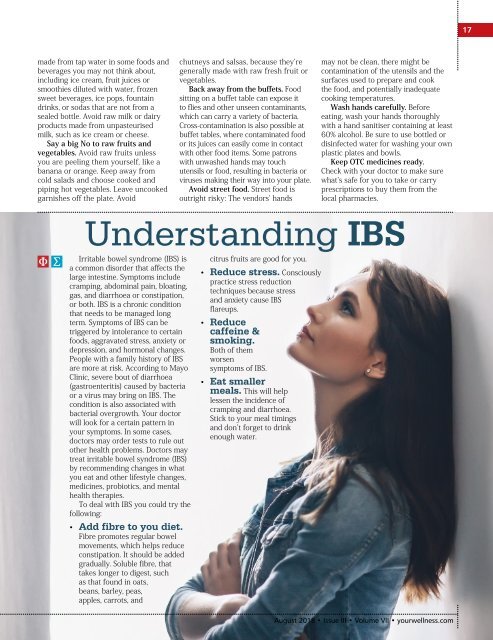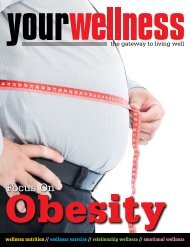You also want an ePaper? Increase the reach of your titles
YUMPU automatically turns print PDFs into web optimized ePapers that Google loves.
17<br />
made from tap water in some foods <strong>and</strong><br />
beverages you may not think about,<br />
including ice cream, fruit juices or<br />
smoothies diluted with water, frozen<br />
sweet beverages, ice pops, fountain<br />
drinks, or sodas that are not from a<br />
sealed bottle. Avoid raw milk or dairy<br />
products made from unpasteurised<br />
milk, such as ice cream or cheese.<br />
Say a big No to raw fruits <strong>and</strong><br />
vegetables. Avoid raw fruits unless<br />
you are peeling them yourself, like a<br />
banana or orange. Keep away from<br />
cold salads <strong>and</strong> choose cooked <strong>and</strong><br />
piping hot vegetables. Leave uncooked<br />
garnishes off the plate. Avoid<br />
chutneys <strong>and</strong> salsas, because they’re<br />
generally made with raw fresh fruit or<br />
vegetables.<br />
Back away from the buffets. Food<br />
sitting on a buffet table can expose it<br />
to flies <strong>and</strong> other unseen contaminants,<br />
which can carry a variety of bacteria.<br />
Cross-contamination is also possible at<br />
buffet tables, where contaminated food<br />
or its juices can easily come in contact<br />
with other food items. Some patrons<br />
with unwashed h<strong>and</strong>s may touch<br />
utensils or food, resulting in bacteria or<br />
viruses making their way into your plate.<br />
Avoid street food. Street food is<br />
outright risky: The vendors’ h<strong>and</strong>s<br />
may not be clean, there might be<br />
contamination of the utensils <strong>and</strong> the<br />
surfaces used to prepare <strong>and</strong> cook<br />
the food, <strong>and</strong> potentially inadequate<br />
cooking temperatures.<br />
Wash h<strong>and</strong>s carefully. Before<br />
eating, wash your h<strong>and</strong>s thoroughly<br />
with a h<strong>and</strong> sanitiser containing at least<br />
60% alcohol. Be sure to use bottled or<br />
disinfected water for washing your own<br />
plastic plates <strong>and</strong> bowls.<br />
Keep OTC medicines ready.<br />
Check with your doctor to make sure<br />
what’s safe for you to take or carry<br />
prescriptions to buy them from the<br />
local pharmacies.<br />
Underst<strong>and</strong>ing IBS<br />
Irritable bowel syndrome (IBS) is<br />
a common disorder that affects the<br />
large intestine. Symptoms include<br />
cramping, abdominal pain, bloating,<br />
gas, <strong>and</strong> diarrhoea or constipation,<br />
or both. IBS is a chronic condition<br />
that needs to be managed long<br />
term. Symptoms of IBS can be<br />
triggered by intolerance to certain<br />
foods, aggravated stress, anxiety or<br />
depression, <strong>and</strong> hormonal changes.<br />
People with a family history of IBS<br />
are more at risk. According to Mayo<br />
Clinic, severe bout of diarrhoea<br />
(gastroenteritis) caused by bacteria<br />
or a virus may bring on IBS. The<br />
condition is also associated with<br />
bacterial overgrowth. Your doctor<br />
will look for a certain pattern in<br />
your symptoms. In some cases,<br />
doctors may order tests to rule out<br />
other health problems. Doctors may<br />
treat irritable bowel syndrome (IBS)<br />
by recommending changes in what<br />
you eat <strong>and</strong> other lifestyle changes,<br />
medicines, probiotics, <strong>and</strong> mental<br />
health therapies.<br />
To deal with IBS you could try the<br />
following:<br />
• Add fibre to you diet.<br />
Fibre promotes regular bowel<br />
movements, which helps reduce<br />
constipation. It should be added<br />
gradually. Soluble fibre, that<br />
takes longer to digest, such<br />
as that found in oats,<br />
beans, barley, peas,<br />
apples, carrots, <strong>and</strong><br />
citrus fruits are good for you.<br />
• Reduce stress. Consciously<br />
practice stress reduction<br />
techniques because stress<br />
<strong>and</strong> anxiety cause IBS<br />
flareups.<br />
• Reduce<br />
caffeine &<br />
smoking.<br />
Both of them<br />
worsen<br />
symptoms of IBS.<br />
• Eat smaller<br />
meals. This will help<br />
lessen the incidence of<br />
cramping <strong>and</strong> diarrhoea.<br />
Stick to your meal timings<br />
<strong>and</strong> don’t forget to drink<br />
enough water.<br />
<strong>August</strong> <strong>2018</strong> • Issue III • Volume VII • yourwellness.com
















